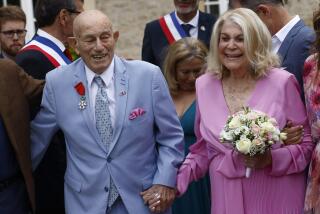War’s Specter Spurs Military Couples to Say ‘I Do’ by Proxy
- Share via
For Marine Gunnery Sgt. Jerry Watts, who is awaiting war in the Saudi Arabian desert, there are some events back home that he will have to catch up on later--Christmas dinner with the family, that crazy New Year’s Eve party, even his own wedding.
His wedding?
Last week, bride-to-be Candy Smith stood before a justice of the peace at Las Vegas City Hall and deliberately recited her wedding vows. Right next to her, seated in a shiny metal wheelchair, was her 82-year-old father, Duke Johnston.
On that memorable day, as the groom prepared for battle in some troubled faraway land, it was Dad who stepped in to say “I do” at his daughter’s wedding.
The sudden separation brought on by the Persian Gulf crisis has created some unusual hardships for military men and women dispatched overseas and for those left behind to wait and wonder.
But none so bizarre perhaps as the measure taken by couples such as Jerry and Candy Watts of Escondido--who got married by proxy before war broke out rather than face the prospect of never taking that stroll down the aisle.
In a proxy marriage, the ceremony is celebrated without one of the vow-takers, who authorizes a substitute to represent him or her in the ceremony.
“It was really strange not having your groom there at your own wedding,” said the new Mrs. Watts, a 31-year-old nurse. “But I had a picture of him in front of me the whole time that I kept looking at.
“The ceremony was real hard. But by far the hardest part came on the wedding night. I was all alone, and my new husband was half a world away.”
For Candy Watts, however, the sacrifice was well worth it. As a military wife, she would no longer have trouble getting on base at Camp Pendleton or enrolling in group support sessions to help deal with the long months without her man.
And, if Jerry were ever killed in a conflict there, she says, she would then be eligible for full military benefits as a surviving spouse.
Candy Watts isn’t alone in her concern. Since Operation Desert Shield was launched in August, officials say, the legal affairs office at Camp Pendleton has received hundreds of requests for information about the legality of proxy marriages.
It was all part of a flurry of wedding activity throughout San Diego County that began after the first ships started leaving port.
Betty Coplin, a nondenominational minister of marriages licensed by the state and county who runs the I Do Weddings business, said the number of weddings rose at the end of the summer--thanks to nervous couples with an eye on the Gulf crisis who decided to take the plunge sooner than later.
Out of 150 ceremonies Coplin performed in August, 120 involved Marines leaving for the Persian Gulf. “At one point, I was doing 12 a day,” she said. “I’ve never seen anything of this nature.”
The proxy inquiries at Camp Pendleton began after some couples--many of whom had planned weddings in the upcoming weeks or months--didn’t make the deployment deadline, and found themselves suddenly separated by military notice of sometimes less than 24 hours that sent tens of thousands scrambling for their assignments aboard Gulf-bound ships.
Cpl. Lyle Gilbert, a base spokesman, said the Marine Corps officials at Camp Pendleton recognize such ceremonies as long as they are conducted in states where they are legally sanctioned.
Proxy marriages are legal in several Western states, including Colorado, Texas, Montana and Nevada. Although California law prohibits proxy marriages from taking place here, officials say, the state will honor properly sanctioned proxy ceremonies after the fact.
“If a proxy marriage is a legal marriage, then the couple is entitled to the same benefits as two people who were married face to face,” Gilbert said. “It all depends if a Marine notifies the base.”
But not everyone in the military community is convinced of the worth of these marriages.
Capt. James Black, an attorney for the joint legal assistance office at Camp Pendleton, said he has advised would-be military spouses against what he calls a drastic move.
“Proxy marriages may be convenient, but I advise Marines and sailors against them because there may eventually be questions raised about their validity,” he said. “There may be a problem receiving military benefits down the road, that’s what concerns me.”
Military men and women with spouses and dependents receive additional Basic Allowance for Quarters (BAQ) pay, which could amount to hundreds of dollars a month, depending upon rank.
“If a Marine is killed over there, the Corps might say, ‘We’re really sorry, ma’am, but you just don’t qualify for benefits,’ ” Black said. “Proxy marriages just create doubtful relationships for financial purposes.
“I just tell people it’s best to wait for the person to come home, then go see that justice of the peace.”
Black said he knows of at least one other Camp Pendleton-based couple who opted for a proxy wedding after notarized forms were received from the military man in the Middle East.
For Candy Watts, the wedding was just another weird chapter in a relationship with any number of oddball turns.
She met her husband-to-be at a friend’s house last summer while on her way to a formal dance. He was headed to a country and Western bar.
Later, she met him there by chance. They did the two-step--he in blue jeans, she in an evening gown.
They were due to be married in March. But then Watts, 35, a platoon commander, was sent to the Gulf. One day, he called her from a pay phone in Saudi Arabia to restate his intentions.
He asked her to marry him all over again.
“He called me out of the blue with a poem he wrote,” she recalled. “It was so cute. It ended with the words ‘From this phone booth between the Persian Gulf and Red Sea. Honey, will you marry me?’ ”
He was expected home in January. Then, one day, while shopping at the Price Club, Candy saw a television news broadcast announcing that her fiance and other military men and women in the Persian Gulf would be forced to remain in the region indefinitely.
“I wanted to kick in that picture tube, I was so upset,” she said. “There were tears running down my face.”
Then her mother read a magazine article about proxy marriages. Candy made some calls to attorneys to explore what paperwork was involved.
“We wanted to get married now, so that, if something happens, both me and the girls would have the military support,” Watts said of her two daughters from her husband’s former marriage.
“Before we got married, it was pretty miserable. I couldn’t even get on base without being hassled--let alone explore the possibility of counseling.”
Cecelia Frymier of Oceanside plans to leave for Las Vegas this morning for a similar proxy marriage, where she will exchanged vows with her 18-year-old son.
She and her boyfriend, Gunnery Sgt. Bill Hayes, are friends of the Wattses, and both she and Candy struck upon the idea of a proxy marriage at the same time. And for the same reason.
After Bill left for the Persian Gulf, she just got tired of being made to feel like a second-class citizen around legitimate military wives.
“All the support groups are geared toward the military wives,” she said. “We girlfriends, we’re just nobodies. The people say that the separation doesn’t hurt us as much because we’re not wives, that girlfriends come and go.
“When I get home from that ceremony, there’s going to be no argument.”



